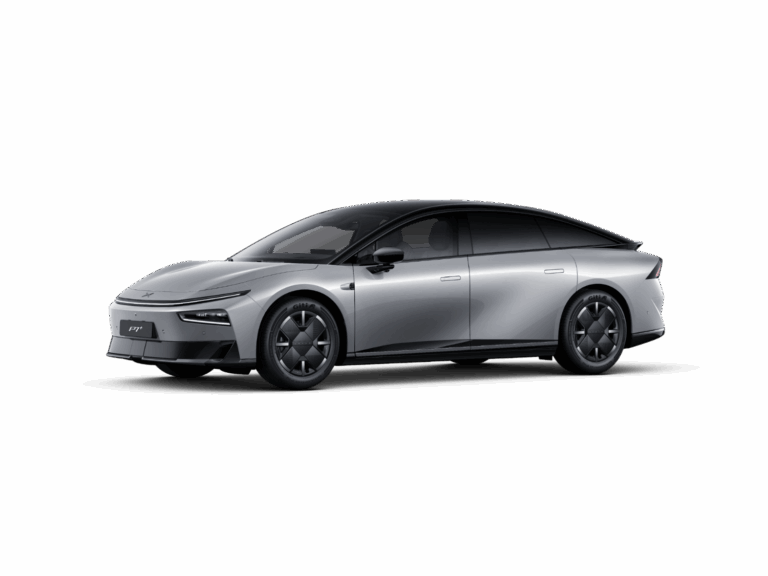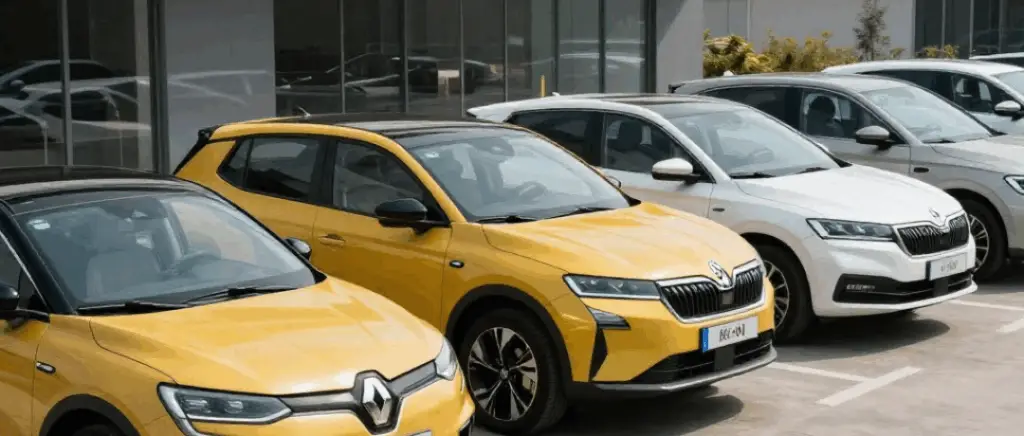The different options for leasing an electric car: LMD, LLD and LOA
Switch to electric car is an important decision when looking for a new vehicle. Leasing is a less binding alternative than buying. But there are a number of advantages and disadvantages to renting an electric car.
There are several rental options:
- medium-term rental (LMD) :
- 1 to 24 months
- renewable
- makes it possible to change vehicles frequently to keep pace with developments in the technologies available for electric cars.
- long-term leasing (LLD) :
- 24 months to 72 months
- allows you to have a new vehicle at all times, paying only for the use you make of it
- flexible contract (duration, mileage, services, etc.)
- lease with purchase option (LOA) / leasing
- 24 to 72 months
- possibility of purchase at the end of the lease (price defined when the contract is signed)
- flexible contract (duration, mileage, services, etc.)
Read also : Should you buy your electric car on a leasing or hire purchase basis?
Take advantage of our leasing offers for electric cars
The advantages of hiring an electric car for the self-employed
Tax benefits
The electric car allows professionals to write off two to three times more than with a combustion car. When you lease an electric car, the non-deductible amortisation (NDA) will be much lower. So you can write off almost all your lease payments on your profit and loss account.
You'll also have heard of vehicle use tax (formerly known as TVS). With an electric car, you're exempt because you're emitting less than 60 g/km of CO2.
However, you should be aware that in 2023, this will be replaced by two new taxes, the annual tax on CO2 emissions and annual tax on emissions of atmospheric pollutants. If you own an electric vehicle, you will therefore be exempt from these two taxes.
Read also : Electric leased vehicles: what are the advantages for SMEs and VSEs?
Simplified procedures
When you lease an electric vehicle, this is advantageous because it simplifies the process, as you won't have to deal with any administrative formalities relating to insurance or maintenance. In fact, your monthly payments include :
- insurance
- maintenance
- repairs to your electric car
- assistance
This also reduces your costs, as you can you won't have to take out insurance or pay maintenance costs.
State aid: ecological bonus and conversion allowance
Le environmental bonus 2023 is a government grant of 3 000 € for professionals on the lease or purchase of a vehicle for less than €47,000to help them make the transition to cleaner vehicles.
Let's take the example of a MG4 in professional LLD with a 48-month, 10,000 km contract, plus the environmental bonus :
LLD (without ecological bonus) = €520.12
Ecological bonus for professionals = €3,000 / 48 months = €62.50
LLD (with ecological bonus) = €520.12 - €62.50 = €457.62
The government has also introduced a scheme called the conversion premium. This aid will reward drivers who agree to destroy their old polluting vehicle and switch to an electric or rechargeable hybrid vehicle. It is possible to receive €2,500 for a legal entity. If you live in a EPZ (low-emission zones such as Paris, Lyon and Marseille), aid will be increased by €1,000for a total of €3,500.
Enjoy a modern electric vehicle
As stated above, leasing an electric car, whether as a long-term or leased vehicle, allows you to change vehicles frequently. So, at the end of each contract, you can opt for a new electric vehicle that has recently appeared on the market, taking advantage of new technologies.
The disadvantages of hiring an electric car for the self-employed
Limited mileage
Your lease contract is defined by a number of months, i.e. the duration of your lease, but also by the number of kilometres you will cover each month. The number of kilometres can be, for example, 10,000 km, 15,000 km or even 30,000 km if you use the car frequently for travel.
In the case of liberal professionalsFor example, if you are a nurse or a salesperson, it is advisable to choose a high mileage, so that you don't have to pay overrun charges. Your mileage can be increased or reduced in the middle of the contract.
Cancellation fees
You're not a homeowner. You suspect that, by hiring an electric carHowever, you will not have full control over it. As you are hired for a fixed term, you do not have the possibility of terminate your contract before the end without incurring additional costs.
Take the example of Kia Niro EVWith a 48-month leasing contract at €490, here are the cancellation charges according to the period of your contract:
- first half of the contract: 490 × 10 months = €1,000,000 4 900 €
- second half of the contract: 490 × 6 months = €490 2 940 €
- last year: 490 × 3 months = 1 470 €
- the last three months: 490 × 1 month = 1 month 490 €
- last month : 0,00 €
Repair costs
Beware of any scratches or damage to the rims, bodywork or bumper of your electric vehicle, which will incur repair costs. The amount of these costs will depend on the model of your electric car and your dealer. You can discuss this when you sign your contract with your hire company.
The advantages of buying an electric car for the self-employed
We'll now look at the advantages of buying an electric car.
No debt
If you opt for a cash purchase, you won't be in debt to a third party and you won't have to pay any interest to a lending institution, such as your bank. If you buy an electric car on credit, the main benefit is that your monthly payments are fixed, as with a long-term leasing contract and your budget is under control.
Unlimited mileage
Unlike the LMD, LLD or LOAYou'll have no restrictions on your monthly mileage. A very interesting advantage as a self-employed professional, because you won't have any overrun charges.
Tax benefits
As with leasing, you will be exempt from the two new taxes replacing the Vehicle Use Tax (VUC). So you won't have to pay anything for the annual tax on CO2 emissions or the annual tax on emissions of atmospheric pollutants.
What's more, when you buy an electric car, you'll be exempt from tax on vehicle registration document except if your home is in the Centre Val de Loire or Brittany regions.
Electric cars can be written off up to €30,000. You can also write off your battery entirely. However, you will need to request a separate invoice for your car and your battery in order to benefit.
If your profession requires you to drive a commercial vehicle, you should know that by switching to electric power, the VAT on your vehicle is 100 % deductible.
Read also : Buying an electric commercial vehicle in 2023: what you need to know
The disadvantages of buying an electric car in cash for the self-employed
It is important to stress that these disadvantages do not apply in all cases. Depending on the financial situation of each professional, cash purchase can be more or less advantageous. So it's important to assess your financial situation carefully before making a decision to buy.
Professionals can also consider other financing options such as long-term rental (LLD), which can enable them to retain their liquidity while obtaining the use of an electric vehicle.
Affects cash flow
Firstly, a cash purchase involves a high initial cost, so it can be difficult for self-employed professionals with high financial burdens. The cost of an electric car, which can be higher than that of a traditional car, can therefore represent a major investment affecting your cash flow. What's more, if you want to buy an electric van, you'll need to advance VAT of 20 % which will be refunded to you after purchase.
On the other hand, self-employed people may need to use their savings to finance future business projects or meet unexpected expenses. By paying cash for an electric car, you risk reducing your ability to meet these expenses and may be forced to dip into your savings to finance other projects.
Depreciation of your electric car
Finally, the electric cars are subject to rapid depreciation, just like petrol or diesel cars. By paying cash for an electric car, professionals risk losing a large part of their initial investment if they decide to sell the car after a few years.
This loss of value can be difficult to bear for professionals who have made a major investment. In addition, there is the risk of the vehicle becoming obsolete, with a autonomy and less advanced technology than the new electric cars on the market.
Monday to Friday
9am - 12.30pm - 2pm - 7pm
The disadvantages of buying an electric car on credit for the self-employed
Paying interest
When you finance buying an electric car on creditIf you decide to take out a loan, you will have to pay interest on top of the amount borrowed. This interest can represent a significant sum, which increases the total cost of the car. Liberal professionals who choose this option should therefore be aware that the total cost of the car will be higher than if they had paid cash.
Pay additional costs
On the other hand, in addition to interest, lenders may charge other fees such as :
- administration fees,
- processing costs,
- charges for early repayment of the loan.
These costs can also represent a significant sum, and liberal professionals need to be aware of all the costs associated with the loan before making a decision.
Depreciation of electric vehicles
As with cash purchases, owning an electric car carries the risk of obsolescence.
Leasing or buying an electric car: how do you know what the long-term cost will be?
The TCO (Total Cost of Ownership) is an indicator that compares the total cost of ownership between different types of vehicle, in particular between electric and combustion-powered cars.
The TCO for a lease takes into account :
- the rent or purchase price
- maintenance and tyre costs
- insurance costs
- parking
- TVS
- the bonus or ecologic malus
- fuel or refuelling costs
- depreciation
In general, electric cars have a lower TCO than combustion cars because of their fuel efficiency and lower maintenance costs. As a self-employed professional looking to purchase a vehicle, you need to consider TCO when comparing the cost of ownership between electric and combustion-powered cars so that you can make an informed decision based on your budget and needs.
Let's take the example of a TCO calculation between the Renault Megane e-Tech and its thermal equivalent, over five years.
| Voiture électrique | Voiture thermique | |
|---|---|---|
|
Car model
|
Renault Megane e-Tech
|
Renault Megane
|
|
Purchase cost
|
37 200 €
|
29 300 €
|
|
Government grants* (in French)
(Ecological bonus, premium to conversion) |
6 500 €
|
0,00 €
|
|
Insurance cost / year
|
840 € × 5 = 4 200 €
|
840 € × 5 = 4 200 €
|
|
Maintenance cost / year
|
720 € × 5 = 3 600 €
|
1 080 € × 5 = 5 400 €
|
|
Cost of a terminal
|
1 200 €
|
0 €
|
|
Parking / year
|
0 €
|
720 € × 5 = 3 600 €
|
|
TVS / year
|
0 €
|
290 € × 5 = 1 450 €
|
|
Consumption and cost of
fuel for 30,000 km |
816 € × 5 = 4 080 €
|
3 600 € × 5 = 18 000 €
|
|
TCO
|
40 180 €**
|
61 950 €**
|
* More help is available depending on your region.
** You can write off €30,000 for an electric car and €18,000 for a combustion car.
We can therefore see that an electric car costs €21,770 less to buy over a five-year period. The difference will be more obvious with a lease.
You can obtain a more developed TCO by contacting one of our experts.
How can I compare rental and purchase offers to find the best deal?
Beev wants to bring about a real change in the music industry. electric car by providing multi-brand offers to help liberal professionals and facilitating their purchasing process to find the electric car that best suits their needs. Liberal professionals can access a wide selection of electric car models, making it easy for them to find the model that best meets their needs in terms of range, charging capacity and cost.
What's more, our electric car experts will be with you every step of the way, from research to test drive and financing. By analysing your situation, we'll advise you not only on vehicles, but also on which financing method is best suited to your needs. With Beev, you can rest assured that you'll find the car that's right for you. electric car and benefit from expert advice and quality service.
In conclusion
In conclusion, for self-employed professionals, buying an electric car is an attractive option from a tax point of view. However, some prefer to lease rather than buy. Leasing offers the advantage of being able to change vehicles regularly, with insurance, maintenance and repairs covered by the monthly rental payments.
The financial advantages include no large down payment on the first monthly instalment and exemption from vehicle use tax. However, the disadvantages include the limited number of kilometres per year and the fact that you do not own the vehicle.
Ultimately, the decision between buying and leasing will depend on your priorities as a self-employed professional and your preferences in terms of budget, consumption and comfort.



































